Today’s Current Affairs: 24th Jan 2024 for UPSC IAS exams, State PSC exams, SSC CGL, State SSC, RRB, Railways, Banking Exam & IBPS, etc
Table of Contents
Ingenuity Mars Helicopter:

NASA has re-established contact with its Ingenuity helicopter on Mars, the US space agency said recently
- Ingenuity Mars Helicopter is a small, autonomous aircraft that flew to Mars aboard NASA’s Perseverance rover.
- It was sent to Mars to perform experimental flight tests to determine if powered, controlled flight at the Red Planet was possible.
- Ingenuity’s mission is experimental in nature and completely independent of the rover’s science mission.
- Ingenuity was deployed to the surface on April 4, 2021.
- On April 19, it became the first aircraft in history to make a powered, controlled flight on another planet.
- It managed to fly in Mars’ thin atmosphere, which isn’t conducive for flying.
- It’s piloted by onboard guidance, navigation, and control systems running algorithms.
- Perseverance acts as a relay between the chopper and the earth.
Sanatan Khadi Vastra:
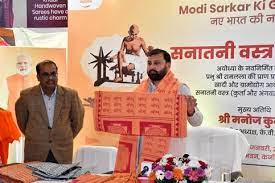
Khadi and Village Industries Commission (KVIC) launched a new range of ‘Sanatan Khadi Vastra’.
- KVIC Chairman Manoj Kumar launched Sanatan Vastra made from Khadi clothes at the flagship Khadi Bhawan in Connaught Place in Delhi.
- Sanatan Khadi Vastra by: Khadi and Village Industries Commission (KVIC).
- The design of Sanatan clothing has been prepared at the Khadi Centre of Excellence located at NIFT.
- The creation of Khadi involves no mechanical or chemical processes, distinguishing Sanatan textiles for adhering to traditional Indian methods.
- To celebrate the launch, KVIC offered a special 20% discount on ‘Sanatan Vastra’ and 10% to 60% on other Khadi and village industry products from January 17 to 25, 2024.
- ‘Sanatan Vastra’ embodies a fusion of India’s rich heritage and contemporary fashion trends.
- It holds a broader significance in enhancing the livelihoods of countless rural artisans.
- This initiative contributes significantly to the economic empowerment of these communities.
FiloBot : Plant-Inspired Robot
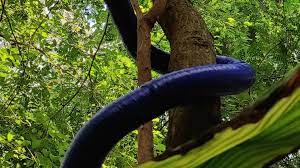
A new innovative plant-inspired robot which is named FiloBot has been developed that climbs up structures just like climbing vines.
- FiloBot is different from conventional climbing robots as it doesn’t depend on pre-programmed movements.
- It instead absorbs 3D printing filament through its head and extends its length over time, just like a creeper.
- The team utilised a combination of plant behaviours like phototropism, negative phototropism and gravitropism and utilises these naturally occurring behaviours in high-tech robots.
- The tests for FiloBot have been successful and displayed remarkable adaptability that adjusts its growth trajectory dynamically in response to moving light intensity.
- By equipping autonomous systems with transportable additive manufacturing techniques merged with bioinspired behavioural strategies, future robots can navigate unstructured and dynamic environments and even be capable of self-building infrastructure.
- This new innovation has opened new potential impact of technology that can be applied in robotics, where adaptability and responsiveness redefine the capabilities of climbing robots.
Parakram Diwas:

The Prime Minister of India has extended greetings to the people of India on Parakram Diwas.
- Parakram Diwas is celebrated on January 23 to commemorate the birth anniversary of freedom fighter Subhas Chandra Bose.
- This year marks the 127th birth anniversary of Bose, fondly known as ‘Netaji’.
- Parakram Diwas aims to instil fearlessness and patriotism, especially among the youth, inspiring them to stand strong in the face of challenges.
Subhas Chandra Bose:
- He was born on January 23, 1897, in Cuttack, Orissa.
- In 1920, he passed the civil service examination, but in April 1921, after hearing of the nationalist turmoil in India, he resigned from his position.
- He was an Indian nationalist leader who was a key figure in the Indian independence movement against British colonial rule.
- Bose then joined the Indian National Congress and actively participated in the Indian independence movement.
President of Indian National Congress: Bose was elected president of the Indian National Congress for two consecutive terms but resigned from the post following ideological conflicts with Mahatma Gandhi. - In 1939, he formed the Forward Bloc, an organization aimed at unifying all the anti-British forces in India.
- With Japanese assistance, he reorganized and later led the Indian National Army, formed from Indian prisoners-of-war and plantation workers from Malaya, Singapore, and other parts of Southeast Asia, against British forces.
Exercise Khanjar:
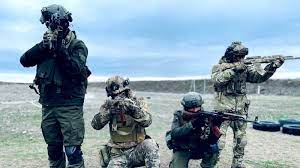
India-Kyrgyzstan Joint Special Forces Exercise KHANJAR has commenced at the Special Forces Training School in Bakloh, Himachal Pradesh.
- Exercise Khanjar was first initiated in December 2011, in Nahan, India.
- It is the 11th edition of India-Kyrgyzstan Joint Special Forces Exercise.
- It is an annual event conducted alternately in both the countries.
- The Indian Army contingent comprising 20 personnel is being represented by troops from The Parachute Regiment (Special Forces) and the Kyrgyzstan contingent comprising 20 personnel is represented by Scorpion Brigade.
- Aim of the exercise is to exchange experiences and best practices in Counter Terrorism and Special Forces Operations in Built-up Area and Mountainous Terrain under Chapter VII of United Nations Charter.
- The exercise will emphasise on developing Special Forces skills, advanced techniques of insertion and extraction.
- The exercise will provide an opportunity for both the sides of fortify defence ties while addressing common concerns of international terrorism and extremism.
- The exercise will also accord opportunity to showcase capabilities of cutting edge indigenous defence equipment besides achieving shared security objectives and foster bilateral relations.
FAO’s Committee On Fisheries : India Elected As First Vice Chair

India has been elected as the First Vice Chair of the Food and Agriculture Organization’s Committee on Fisheries (COFI) Sub-Committee on Fisheries Management.
- FAO’s Committee on Fisheries is a subsidiary body of the Food and Agriculture Organization.
- It was established by the FAO Conference in 1965.
- It addresses issues on international fishing and aquaculture, providing policy guidance on fisheries management, recognising global challenges, and promoting collective solutions to ensure the environmental, economic and social sustainability of the fishing industry.
- The grouping makes recommendations to the FAO Council or its Director-General.
- It has also been used as a forum in which global agreements and non-binding instruments were negotiated.
- The Committee also reviews specific matters relating to fisheries and aquaculture referred to it by the Council
- The Sub-Committee on Fisheries Management is a new sub-group formed under the COFI in 2022, during the 35th session of the FAO Committee on Fisheries (COFI), held in Rome.
- It will work closely with the two other COFI sub-committees, the Sub-Committee on Aquaculture and the Sub-Committee on Fish Trade.
Andrographis theniensis : New Plant Species
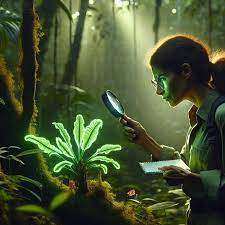
A new plant species has been discovered in Theni district of Tamil Nadu in the Western Ghats by a research student from Wanaparthy.
- Andrographis theniensis is a plant, which was named ‘Andrographis theniensis’ after the location (Theni).
- The new plant resembles Andrographis megamalayana.
- It has glabrous leaves and stems, a nine-veined lower lip, pale yellowish sparse hair on the middle lobe of the lower lip and yellow anther.
- Andrographis is a tropical Asian genus native to Bangladesh, India, Myanmar, Nepal, Sri Lanka and the West Himalaya.
- However, a majority of Andrographis taxa are distributed in southern India and Sri Lanka, particularly in Western and Eastern Ghats.
- There are nearly 25 Andrographis species in India.
- This genus is traditionally used to treat various ailments such as cold, cough, fever, jaundice, diarrhoea, cardiovascular and hepatic diseases in both codified and non-codified medicinal systems.
Joint Special Forces Exercise Cyclone:

The Indian Army contingent comprising 25 personnel reached Egypt to take part in the India-Egypt Joint Special Forces Exercise CYCLONE.
- Exercise Cyclone is the 2nd edition of the Exercise Cyclone which will be conducted at Anshas, Egypt from 22nd January to 1st February 2024.
- The first edition of the exercise was conducted last year in India.
- The Indian contingent is being represented by troops from the Parachute Regiment (Special Forces) and Egyptian contingent comprising 25 personnel is being represented by Egyptian Commando Squadron and Egyptian Airborne Platoon.
- Aim of the Exercise is to acquaint both the sides with each other’s operating procedures in the backdrop of Special Operations in desert/ semi desert terrain under Chapter VII of United Nations Charter.
- Exercise CYCLONE is designed to develop bilateral military cooperation and strengthen bond between two armies through conduct of discussions and rehearsal of tactical military drills.
- It will involve planning and execution of special operations in sub conventional domain and conducted in three phases.
- While the first phase will include Military Exhibitions and Tactical Interactions, second phase will focus on training on Improvised Explosive Device (IED), counter IED and Combat First Aid.
- The third and final phase will encompass Joint Tactical Exercise based on Fighting in Built-up Area and Hostage Rescue Scenarios.
Coral Reef:
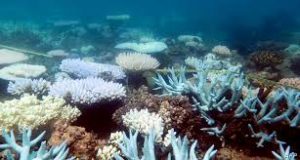
Scientists have mapped the largest known deep-sea coral reef off the US Atlantic coast, stretching about 310 miles from Florida to South Carolina.
- Unlike tropical coral reefs, deep-sea coral must filter food particles from the water for energy.
- The newly discovered reef, which provides habitat for various marine species, has been called “breathtaking in scale” and covers nearly three times the size of Yellowstone National Park.
- A coral reef is a complex underwater ecosystem made up of colonies of coral polyps held together by calcium carbonate. Coral reefs are often called the “rainforests of the sea” and support about 25% of all known marine species
- Deep-sea corals are also called cold-water corals.
- They don’t rely on photosynthesis because they’re living in the dark.
- Instead, they use the tentacles on their polyps to filter food out of the surrounding waters.




